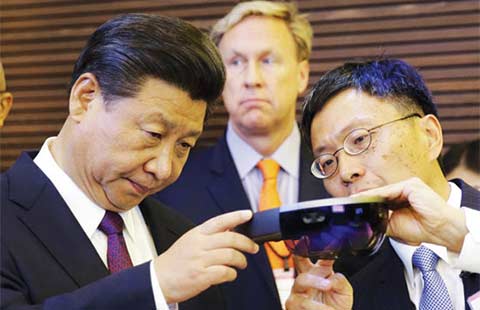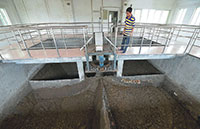A place where success is smooth as silk
By Tom Clifford in Nanjing and Xuzhou, Jiangsu province (China Daily) Updated: 2015-12-04 15:56 |
|
A view from Nanjing's city wall, which was built during the Ming Dynasty (1368-1644). [Wang Luxian / for China Daily] |
Jiangsu's capital, Nanjing, was the national capital for more than 450 years, and this has left a deep mark on a city that can trace its roots back 2,500 years. But the city, with more than 8 million residents, is not relying on past glories to forge a new path.
New opportunities present new challenges.
The Nanjing Jiangbei New Area, covering 788 sq km, and the Lianyungang Xuwei New Area, spanning 467 sq km, are examples of a comprehensive approach to the initiative that lacks nothing for foresight and ambition.
Strategically located at the intersection of the Yangtze River and the eastern economic powerhouses, Jiangbei New Area is the cradle of China's chemical industry.
In 1937, China's first chemical fertilizer was produced in a factory owned by Fan Xudong, "the father of the Chinese chemical industry".
It now boasts five State-level and provincial industrial parks with an industrial output of 380 billion yuan ($59.6 billion) in 2014 and can harness a port that allows cargo ships of up to 50,000 metric tons to directly enter Nanjing waters. Ships of 100,000 tons can enter at high tide.
Xuwei is also making its economic presence felt. Designated by the State Council as a pilot zone of the China Eastern Central Western Demonstration Area for regional cooperation, Xuwei's rail, roads and deep water port link it to mid and western China and the Huaihai economic region.
It is taking full advantage, as is the province in general, of the concept of "last mover", which means it is building on others' experiences to make it more efficient and avoid the pitfalls of other ports. It is expected to have an annual capacity of 500 million tons by 2020.
With a social fixed-asset investment of nearly 50 billion yuan and industrial investment of 20.7 billion yuan, 15 major industrial projects are in the pipeline or under construction.
Companies taking advantage of this development range across sectors, from commerce to heavy manufacturing. And despite their current size, some have humble beginnings that provide inspiration and lessons in how major companies grow from the smallest of beginnings.
- Hundreds of fugitives are brought back since April
- New steps will simplify driving training and tests
- Capital opens door to hukou applicants
- Nobel Prize 'to spur TCM development'
- Beijing lifts red alert but smog will be back in two days
- Psychiatrist links smog, depression
- Weather a bonanza for taxi services
- Lawyer: Top court OKs death sentence in poisoning case
- Power for ministries to be clarified
- Red alert helps to reduce pollutants, say experts







